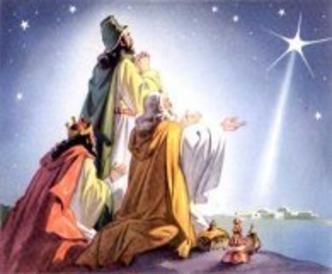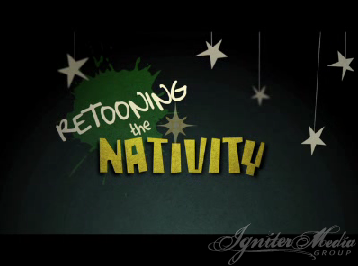As most biblically trained Christians know, there are a lot of subtle unbiblical elements of the Christmas story that have snuck into our culture, even into our teaching at church. Mary on the donkey, the Inn Keeper, the “Three Kings” etc. Most of these “errors” are minor or harmless, but they do reflect a tendency toward laziness when it comes to teaching the Bible. Below is a link to a video that points out a few of those errors, while at the same time honoring the Christmas story – rather than just knit-picking, as I’ve often seen done.
Retooning the Nativity (opens in new window)
 Funny story – I got in a lot of heat one year for having the Wise Men in the Navity Scene of the Christmas play. It had never crossed my mind before. I was told “that is why the wise men are always placed at a distance away from the actual manger scene, they were on their way.” Duh, silly me, I had no idea they walked so slow and were two years away in all those lawn nativity scenes.
Funny story – I got in a lot of heat one year for having the Wise Men in the Navity Scene of the Christmas play. It had never crossed my mind before. I was told “that is why the wise men are always placed at a distance away from the actual manger scene, they were on their way.” Duh, silly me, I had no idea they walked so slow and were two years away in all those lawn nativity scenes.
However, when I wrote Hark, from the Herald (the Christmas play in the Kidology.org store), I decided to make it accurate, so when the reporter back in time (investigating the true meaning of Christmas) finds himself by the wisemen, I had them invite him on their journey, but when Hark (from the Herald) asks them their ETA (estimated time of arrival) they explain two years, and Hark opts for the time travel machine instead, with a polite, ‘thanks, but no thanks.’ It was my attempt to include them but be biblically accurate for the first time in my ministry. (well, on that topic at least)
Interested in how others include them but keep it accurate. I don’t think it’s too critical with young children. I do have a whole kids church unit on the wise men free for members of Kidology: Wise Kids Still Seek Him
that attempts to be pretty accurate as well, if you are looking for options.
What are your thoughts on teaching Christmas accurately? Or do you let kids figure it out as they get older?







I am using that video as part of my “Family Christmas” service. I too feel a bit weird about seeing the “3 Kings” at the “stable”. (My Veggie Tale Nativity wisemen are on the other side of the kitchen sink from the rest of the Veggie Nativity characters!)
I actually think that several “big kids” will have their eyes open to the actual Christmas story when they see this video. So many of us have grown up with all of the misrepresentations. (I wonder how many really think that Baby Jesus never cried?)
Having said that, that is not what I am focusing on in my message. Rather I am focus on Emmanuel, God With Us and what that can mean to us today.
We teach the story accurately. I don’t want my children growing up thinking Jesus was really born on Dec. 25 instead of in the fall. Or that there were 3 wise men instead of the unknown number. The bible says he received 3 gifts as a young child, not baby, and there is no mention of how many magistrates were there. We talk about how Christmas is a pagan holiday and has nothing to do with Jesus and how the two were combined. And we also talk about how no place in the bible does it command us to celebrate the birth of Jesus. But we do any ways. My kids are 8 and 11. They don’t feel lied to. They don’t feel like they missed out on anything. They are well adjusted children. I think better adjusted for knowing the truths and not the lies.
It is confusing for children when trusted adults allow the lines to become blury. They look to us for truth and for answers. We have an opportunity of only a few precious years to do right by them. Once children reach a certain age, they will start to decide whether or not to look elsewhere. We mustn’t give them good reason for it.
Who is to say when these details are a ‘big deal’ or not. Shall we make the gamble? Kids have enough to figure out on their own.
Even though the star could have appeared two years before the birth of Jesus to give the wise men a head start I don’t believe this is held up by scripture. King Herod killed the boys two years and younger and it is said the wise men came to a house to see a young child.